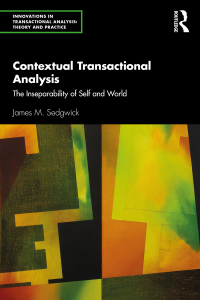Buy Contextual Transactional Analysis: The Inseparability of Self and World 1st Edition PDF ebook by author James M. Sedgwick – published by Routledge in 2021 and save up to 80% compared to the print version of this textbook. With PDF version of this textbook, not only save you money, you can also highlight, add text, underline add post-it notes, bookmarks to pages, instantly search for the major terms or chapter titles, etc.
You can search our site for other versions of the Contextual Transactional Analysis: The Inseparability of Self and World 1st Edition PDF ebook. You can also search for others PDF ebooks from publisher Routledge, as well as from your favorite authors. We have thousands of online textbooks and course materials (mostly in PDF) that you can download immediately after purchase.
Note: e-textBooks do not come with access codes, CDs/DVDs, workbooks, and other supplemental items.
eBook Details:
Full title: Contextual Transactional Analysis: The Inseparability of Self and World 1st Edition
Edition: 1st
Copyright year: 2021
Publisher: Routledge
Author: James M. Sedgwick
ISBN: 9780367192884
Format: PDF
Description of Contextual Transactional Analysis: The Inseparability of Self and World 1st Edition:
Contextual Transactional Analysis: The Inseparability of Self and World offers a novel and comprehensive reworking of key concepts in transactional analysis, offering insight into the causes of psychological distress and closing the gap between training and clinical practice. By providing a bigger picture – as much sociological as psychological – of what it means to be human, the book makes an essential contribution to current debates about how best to account for and work with the social and cultural dimensions of client experience. James M. Sedgwick captures the ongoing importance of what happens around us and the distinctive kinds of psychological distress that arise from persistent and pervasive environmental disadvantage. Beginning with a view of people as always situated and socialized, the book highlights the many ways that the world always and everywhere constrains or enables thought and action. Ranging through ideas about the kinds of contextual conditions which might make psychological distress more likely and illuminating the complex relationship between socialization and autonomy, the book suggests what the implications of these conclusions might be for clinical understanding and practice. Sedgwick’s insightful and compassionate work revises the theoretical framework, fills a current gap in the clinical literature and points the way to greater practitioner efficacy. Contextual Transactional Analysis will be an insightful addition to the literature for transactional analysts in practice and in training, professionals interested in the theory and practice of transactional analysis and anyone seeking to understand the contribution of context to psychological distress.





